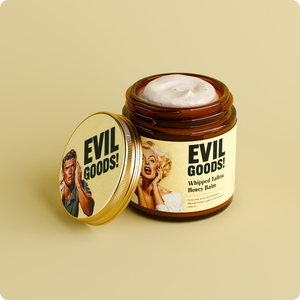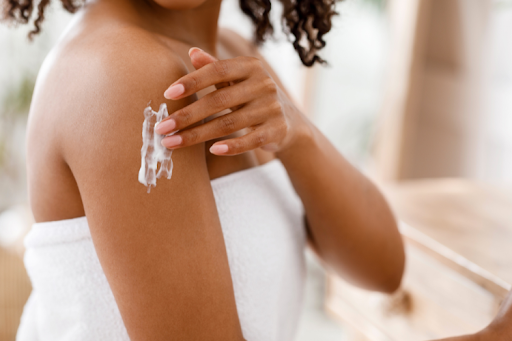Do you ever wonder what happens to your creams and lotions after you apply them? Since your skin is your body’s largest organ, it makes sense to pay attention to the stuff you’re putting on it. Your skincare choices really can affect your health.
Some ingredients in skincare products don’t stay on the surface as you might think. They move deeper, passing through the outer layer (the stratum corneum) into the lower cell layers of the skin. This process is known as skin absorption or dermal absorption. In some cases, absorbed ingredients may even find their way into the bloodstream, causing systemic effects throughout the body.
This guide will help you understand the science behind skin absorption. We’ll also cover bad chemicals in lotions (you’ll want to avoid those) and the benefits of natural skincare for your overall health. With this knowledge, you can make safer choices for your skin care routine.
Skin Absorption & How Your Skin Protects You
As we just mentioned, human skin is your body's largest organ and is primarily made up of three main layers: the stratum corneum, the epidermis, and the dermis. They form a complex barrier that protects the body from the environment while regulating what substances enter it.
The Stratum Corneum: The Outer Wall
The outermost layer (the stratum corneum) acts like a typical "brick-and-mortar wall” that you see on houses, with dead skin cells (the bricks) held together by a lipid-rich "mortar." It’s the main barrier that controls absorption. This layer is tough, especially against big molecules or water-soluble substances. A molecule's chemical properties, such as its lipid solubility and size, determine whether it can pass through this layer.
The Epidermis and Dermis: Deeper Layers
Let’s go a bit deeper. Below the stratum corneum lies the epidermis, a living layer of cells that controls skin hydration, cell replacement, and immune response. Beneath that is the dermis, which is made up of nerves and blood vessels. Molecules penetrate this deeply through percutaneous absorption: they enter the bloodstream and cause systemic effects. In simpler terms, this means the molecules that get through can affect the rest of your body, causing hormone disruption or allergic reactions. (So if your skin breaks out after trying a particularly harsh product, that’s why.)
The total rate of dermal absorption also depends on the skin's surface area and the number of skin appendages, like hair follicles and sweat glands.
How Molecules Travel Through the Skin
Molecules can travel through the skin via three main routes:
-
Intercellular: This is the primary route. Molecules diffuse through the lipid-packed spaces between the cells of the stratum corneum. Oily ingredients, like coconut or mineral oil, get through using this route.
-
Transcellular: Molecules pass directly through the skin cells themselves. This is less common because it means the molecules have to navigate both lipid and water-based phases.
-
Follicular Route: Hair follicles and sweat glands don’t cover much area. However, they can act as shortcuts for bigger or watery molecules, especially in areas with high concentrations of hair follicles.
What Influences Skin Absorption?

Several factors, both scientific and practical, can influence how well your skin absorbs a specific product. This can also have an effect on your long-term health and overall well-being.
Scientific Factors
-
Molecule Size: Smaller molecules penetrate the skin barrier more easily than larger, more complex ones.
-
Lipid Solubility: Oil-loving (lipophilic) molecules diffuse more readily through the skin's lipid layers, but water-soluble substances often have a harder time.
-
Chemical Concentration & Contact Time: Using a higher chemical concentration on your skin encourages faster diffusion. On top of that, the longer you let a product stay on the skin, the greater the absorption.
-
Skin Temperature & Hydration: A higher skin temperature or more skin hydration can increase skin permeability, making it easier to absorb ingredients.
Practical Factors
-
Compromised Skin: Diseased, inflamed, or abraded skin (where the surface layers are broken) can increase skin permeability. This is why people with sensitive or dry skin may experience allergic reactions or contact dermatitis after using a product.
-
Age: Older or very young skin can have a distinct absorption profile.
-
Body Location: Thin skin, such as on the face or oral mucosa (the skin inside your mouth), has higher absorbency than thicker skin on the palms or soles.
-
Formulation & Application: The type of product (gel vs. cream), as well as application methods like massage or occlusion, can affect absorption. Organic solvents and alcohols in some formulations can also temporarily disrupt the skin's lipid barrier, helping products absorb even better.
What Ingredients Help with Absorption?
Certain synthetic substances and their natural alternatives can intentionally enhance absorption. These include:
-
Alcohols and Glycols: These can act as penetration facilitators, increasing solubility and helping substances cross the stratum corneum.
-
Essential Oils: Some essential oils open up your lipids, making passage easier. However, this can also lead to skin irritation or allergic contact dermatitis, especially in people with sensitive skin.
-
Surfactants & Emulsifiers: Found in cleansers and moisturizers, these can remove protective lipids, creating pathways for active ingredients to enter the skin.
-
Occlusive Ingredients: Ingredients that form a seal on the skin, like shea butter or beeswax, prevent water loss and promote hydration, which in turn improves absorption.
Negative Chemicals in Skincare Products

Many skincare products are full of harmful chemicals that are concerning for skin health, the immune system, and human health overall. The presence of many of these chemicals can have adverse effects.
-
Parabens: These are endocrine-disrupting chemicals that can mimic estrogen. They have been found in human tissues, including in breast cancer tumors.
-
Phthalates: Often hidden in the “fragrances” found in many different skincare products, phthalates are linked to hormone disruption and, for pregnant women, have potential risks to the developing fetus.
-
Synthetic Fragrances: A source of allergens that can cause skin irritation, allergic contact dermatitis, and other allergic reactions.
-
Formaldehyde Releasers: These preservatives slowly release formaldehyde, a known skin sensitizer and potential carcinogen.
-
Triclosan: This antimicrobial agent can disrupt the skin’s health and microbiome, and is a concern for environmental harm, especially when it comes to aquatic life.
-
Oxybenzone: A chemical sunscreen ingredient documented by the Food and Drug Administration that is systemically absorbed into the bloodstream. It’s linked to hormone disruption and environmental issues.
-
Sulfates: These strip the skin of its natural oils, leading to dryness, redness, and skin irritation.
-
Butylated Hydroxyanisole (BHA) and Butylated Hydroxytoluene (BHT): Antioxidant preservatives, where animal studies suggest carcinogenicity at high doses.
-
PEGs and Ethoxylated Ingredients: Can be contaminated with 1,4-dioxane, a probable human carcinogen, and may increase skin irritation.
-
Methylisothiazolinone (MI/MCI): A preservative with a high rate of causing allergic contact dermatitis.
-
Heavy Metals: Found in illegal products, mercury is highly toxic and can cause systemic poisoning.
-
Talc: Can be contaminated with asbestos, which poses a respiratory risk if inhaled.
Choosing natural alternatives and simple formulas is essential for supporting your skin's health and preventing irritation or long-term damage.
Why Chemicals Are Bad in Lotions & Moisturizers
Even if the chemical concentration of a substance is low in a product, using multiple skincare products daily can lead to more exposure. Small doses of synthetic substances or harmful chemicals can accumulate over time through repeated dermal absorption. For example, someone who applies lotion, sunscreen, and makeup daily may unknowingly increase their systemic exposure.
If you have a compromised skin barrier due to dryness, skin irritation, or damage, you might experience skin permeability, which gives you deeper and faster systemic absorption. This is especially concerning for people with sensitive skin. Repeated exposure to many chemicals can also sensitize the immune system and disrupt hormones, heightening the risk of allergic reactions or allergic contact dermatitis. Consider switching to organic lotion, which consists of gentle, natural ingredients that nourish the skin from within.
Furthermore, many of these synthetic substances and toxic substances rinse off into waterways, impacting ecosystems. The Environmental Protection Agency highlights that reducing environmental exposure to toxic substances is important for public health and environmental well-being.
Natural skin care is gaining popularity as a safer, gentler alternative to conventional products, offering benefits for sensitive skin and being more environmentally friendly.
What Are Natural Skincare Ingredients?

The term “natural” in natural skincare typically refers to ingredients derived directly from plants, animals, or minerals that undergo minimal processing. Many natural skincare products are formulated with plant-based ingredients.
Many people value these ingredients for their gentle, chemical-free properties and their ability to support the skin's health. This contrasts with synthetic substances or heavily processed compounds, which can harm the skin rather than helping it.
Here are some gentle, natural skincare ingredients with loads of benefits:
Beef Tallow
Beef tallow is a rendered beef fat that’s traditionally used in balms and ointments. It contains saturated and monounsaturated fatty acids like stearic, palmitic, and oleic acids, which closely match some elements of human sebum. It supports your skin barrier, keeps skin hydrated for a long time, and works well for dry skin and in balm products. Because it’s minimally processed, it blends naturally into your skin. Use balms with beef tallow carefully if you have sensitive or acne-prone skin, and patch test first if you’re worried about clogged pores.
Manuka Honey
Manuka honey comes from New Zealand and has high levels of methylglyoxal. It fights microbes, reduces inflammation, and helps heal wounds and repair skin. It draws moisture to your skin’s surface, keeping it hydrated. Use it for spot treatments and healing balms, but avoid it if you’re allergic to bee products.
Magnesium (Topical Magnesium Sulfate or Chloride)
Magnesium salts, like magnesium sulfate or chloride, appear in oils, bath salts, and rubs. They can soothe muscle aches and help your skin relax, supporting its overall health. You can also use a magnesium lotion, which absorbs into your body easily and supports relaxation and sleep.
Use these mostly in baths or as rubs, and don’t expect them to fix magnesium levels inside your body.
Cold-Pressed Olive Oil
Cold-pressed olive oil undergoes minimal processing to preserve its antioxidants and vitamin E. It acts as a rich moisturizer, thanks to oleic acid and polyphenols, helping dry skin and protecting it from damage caused by oxidation and aging. It works well for dry and normal skin types, but might feel heavy or clog pores on oily or acne-prone skin.
Organic Vitamin E (Tocopherol)
Organic vitamin E is a strong antioxidant often added to oils and creams. It protects these products from going rancid, supports your skin barrier, and helps reduce oxidative damage on your skin’s surface. It also works well alongside other antioxidants like vitamin C. Vitamin E is generally safe and suits most skin types.
Other Natural Actives
-
Shea Butter: Moisturizer rich in fatty acids, aids barrier repair.
-
Jojoba Oil: Mimics skin sebum, non-comedogenic moisturizer.
-
Argan Oil: Nourishing with antioxidant and anti-inflammatory effects.
-
Beeswax: Provides a breathable protective layer and seals moisture.
-
Aloe Vera: Soothing, anti-inflammatory, promotes skin hydration.
-
Plant Ceramides: Support skin barrier integrity.
-
Botanical Extracts (Green Tea, Centella): Antioxidant and calm inflammation.
-
Clay: Absorbs excess oil, detoxifies skin surface.
-
Oatmeal: Provides soothing and anti-itch properties, good for sensitive skin.
Many of these are plant-based ingredients, often chosen for skincare because of their healing properties. They do a great job of supporting the skin's health.
Why Natural Skincare Is Important

When you’re applying products to your skin, what you use matters. Natural skincare supports your skin’s balance and reduces risks linked to synthetic chemicals. These are some reasons to switch to natural skincare products:
-
Gentle on the Skin: Natural products usually contain ingredients that your body recognizes, making them less likely to disrupt your skin barrier or microbiome. This helps maintain healthy, hydrated skin.
-
Lower Risk of Irritation: Harsh chemicals often cause redness, itching, or allergic reactions. Choosing natural options reduces the chances of dermatitis and sensitivity.
-
Fewer Harmful Absorptions: Skin can absorb small amounts of what you apply. Natural formulas use simpler, cleaner ingredients, lowering the risk of absorbing toxins into the body.
-
Long-Term Skin Health: Using natural skincare supports your skin over time. Avoiding unnecessary synthetic substances helps you protect your skin from damage caused by environmental stress and harmful chemicals.
How to Shop for Safer Formulas
When shopping for skincare products, your best bet is to look for simple, safe formulas. A short ingredient list often indicates fewer synthetic substances and harmful chemicals that could lead to allergic contact dermatitis. It's also smart to avoid vague terms like "fragrance," which can contain undisclosed chemicals, including endocrine-disrupting chemicals.
Always check the preservative system. While the Food and Drug Administration has regulations, ingredient prohibitions differ in the European Union, making careful risk assessments worthwhile.
If you’re on the lookout for sunscreen, choose a broad-spectrum mineral formula with zinc oxide or titanium dioxide. These sit on the stratum corneum and have minimal percutaneous absorption, protecting the skin surface and preventing skin aging.
Certifications and Checks
Look for third-party certifications like USDA Organic or EWG Verified to ensure the company has used natural ingredients and has excluded toxic substances. Transparent brands will list all their active ingredients clearly, without hiding parent compounds in proprietary blends. This means you can make choices that protect your skin's health, immune system, and overall human health.
Sensitive Skin Considerations
-
Sensitive skin requires gentle and natural skincare products to avoid irritation and allergic reactions.
-
Coconut oil and olive oil are popular natural ingredients for sensitive skin, providing moisturizing and soothing properties.
-
Sensitive skin care routines should avoid harsh chemicals and synthetic substances, opting for natural alternatives instead.
-
Skin hydration is essential for sensitive skin, with natural ingredients helping to lock in moisture and soothe dry skin.
-
Avoiding contact with irritants and allergens is crucial in preventing allergic contact dermatitis and promoting skin health.
Routine Building Tips
Start with the basics: a gentle cleanser, a natural ingredient moisturizer like shea butter, beef tallow, or aloe vera, and sunscreen. Introduce new active ingredients slowly and always patch test on a small section of skin to watch for contact dermatitis or skin irritation. This approach helps you customize your skin care routine according to your skin type and minimize the systemic consequences of chemical concentration buildup.
How Evil Goods Products Can Help

We developed our natural skincare products to focus on simple, well-established natural ingredients. They work in harmony with the skin barrier function and health and do not include synthetic substances linked to allergic contact dermatitis, skin permeability modification, or systemic absorption. We aim to reduce environmental exposure to harmful chemicals.
-
We avoid parabens and phthalates to reduce the risk for sensitive skin and minimize phthalate exposure.
-
We use beef tallow in our balms to repair dry skin and strengthen the stratum corneum.
-
We include manuka honey in our salves for its antimicrobial and healing properties.
-
We use cold-pressed olive oil and organic vitamin E for antioxidant properties and to lock in skin hydration.
-
Our sunscreens are gentle for sensitive skin, with minimal skin absorption and percutaneous absorption.
-
Our natural products include plant extracts and essential oils to promote skin health.
Frequently Asked Questions
Does Your Skin Absorb What You Put On It?
Some ingredients penetrate through the stratum corneum to deeper layers, but many remain on the skin surface. The extent of skin absorption depends on a substance's size, chemical properties, and the product’s formulation.
How Do You Increase Skin Absorption?
To increase skin absorption, you can first remove the barrier of dead skin cells through exfoliation, which allows products to penetrate more effectively. Additionally, applying products to damp, warm skin after showering or steaming helps open pores and delivers active ingredients deeper into the skin.
Does Body Lotion Absorb Into the Blood?
The majority of a product's ingredients are skin-deep; they remain on the skin. However, small molecules can enter the bloodstream, especially if the stratum corneum is damaged or if the product contains organic solvents that temporarily disrupt the barrier.
What Are the Side Effects of Chemicals In Cosmetics?
Possible side effects of chemicals in skincare include skin irritation, allergic contact dermatitis, endocrine disruption, and environmental harm due to synthetic substances.
What Are the Benefits of Natural Skincare?
With natural skincare, you get fewer artificial allergens, hydrating oils like coconut oil and olive oil, and simpler formulas that work for the majority of skin types. They're great for your overall health and gentle on the planet.
Final Thoughts
Natural skincare is all about nourishing your skin with natural ingredients your body recognizes. Our natural skincare products combine the benefits of essential oils, coconut oil, aloe vera, green tea, olive oil, and shea butter for maximum skin hydration and barrier protection.
Healthy skin begins with understanding your skin type and permeability. Nourishing the stratum corneum with the right essential nutrients from natural products can improve the appearance of skin aging, reduce allergic contact dermatitis, and protect against environmental exposure.
If you're searching for safer, more efficient natural skincare products developed with natural alternatives and proven active ingredients, explore our range today. Feed your skin's health without the toxic substances. Your skin deserves it. Shop the entire Evil Goods line of products.

Dr. Elena Dinkollari
MD, Dermatologist & Endocrinology Assistant
Doctor Approved








